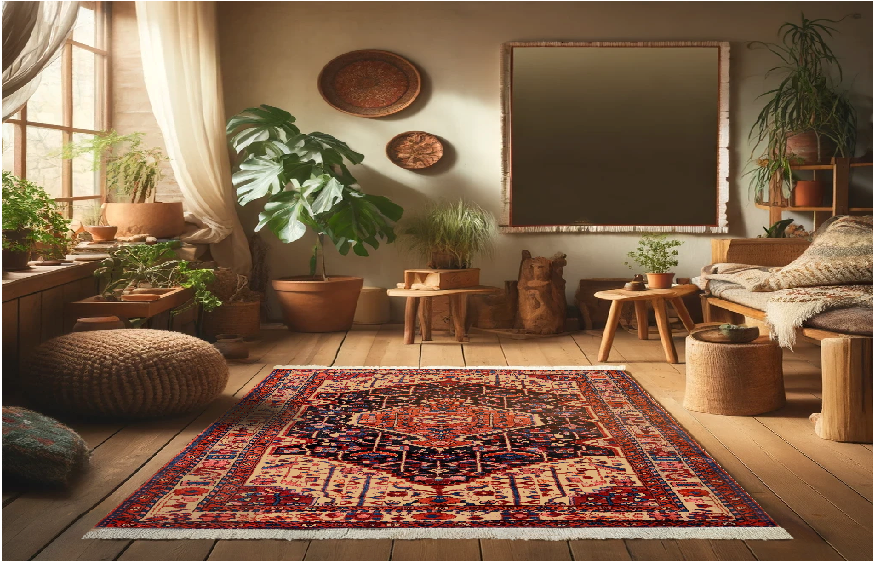In a world increasingly focused on sustainability and eco-friendly living, consumers are becoming more conscious of the products they purchase, especially when it comes to home décor. Persian tribal rugs, especially the hand-knotted varieties, are an exceptional example of eco-friendly craftsmanship. These beautiful works of art go beyond just aesthetics; they embody sustainability, ethical production, and a deep respect for nature.
In this article, we will explore the sustainable benefits of Persian tribal rugs, focusing on their hand-knotted quality, the use of natural materials, and the time-honored techniques that make them a perfect fit for eco-conscious homes. Whether you’re a homeowner looking to add an ethical touch to your living space or a designer searching for eco-friendly options, hand-knotted Persian carpets are a fantastic choice. You can even explore more options at carpetship.com, a platform for unique, authentic hand-knotted Persian tribal carpets.
The Legacy of Hand-Knotted Persian Tribal Rugs
When you think of Persian tribal rugs, what comes to mind is the rich cultural heritage that they represent. Hand-knotted Persian rugs are not just beautiful décor items—they are pieces of history, passed down through generations of skilled artisans. These rugs, made by hand, have a minimal environmental footprint compared to mass-produced rugs.
The production of hand-knotted Persian tribal rugs requires no heavy machinery, reducing energy consumption and lowering carbon emissions. Instead, every knot is tied by hand, often taking months or even years to complete a single rug. This labor-intensive process contributes to the uniqueness of each piece, ensuring that no two rugs are alike. For buyers looking for sustainable luxury, a hand-knotted Persian carpet from a trusted supplier is an ideal investment.
Sustainable Materials: Wool and Natural Dyes
One of the defining features of Persian tribal rugs is their use of natural, eco-friendly materials. Wool is the primary fiber used in creating these rugs, a renewable and biodegradable resource. Sheep are typically shorn annually, making wool a sustainable material when it is ethically sourced. Moreover, wool has natural insulating properties, which can reduce energy use in homes by maintaining room temperature more effectively than synthetic fibers.
In addition to the wool, the dyes used in traditional Persian rugs are extracted from plants, minerals, and insects. These natural dyes are biodegradable and free from harmful chemicals found in synthetic dyes. They produce beautiful, rich colors that do not fade as easily as their chemical counterparts. Natural dyes not only enhance the aesthetics of the rug but also contribute to a greener manufacturing process. So, when you buy Persian tribal carpets from trusted suppliers like Carpetship, you’re supporting a product that’s both sustainable and eco-conscious.
Hand-Made Craftsmanship and Ethical Production
Hand-knotted Persian tribal rugs are often produced by skilled artisans in rural communities. These artisans use techniques passed down through generations, often in family-run operations or small cooperatives. By choosing to buy hand-made rugs, consumers support ethical labor practices, helping sustain traditional craftsmanship and providing economic opportunities in underserved areas.
Additionally, hand-knotted rugs do not rely on factory-based mass production, where unethical labor practices might occur. In the realm of handmade goods, artisans are often paid fairly for their work, which adds a layer of social responsibility to your purchase. Buying a hand-made Persian tribal rug can thus be a conscious choice not just for the environment, but for human rights and fair trade as well.
Why Hand-Knotted Rugs Last a Lifetime
While cheaper, mass-produced rugs made of synthetic fibers may wear out in just a few years, hand-knotted Persian tribal rugs can last for generations when properly cared for. Their durability is a testament to the quality of craftsmanship and materials used in their production. Wool, being a resilient material, can withstand heavy foot traffic without losing its softness or structure. The density of the hand-knotted weave makes the rug more resistant to wear and tear compared to machine-made alternatives.
From an eco-friendly perspective, the longevity of hand-knotted rugs makes them a sustainable choice. Instead of frequently replacing synthetic rugs that will end up in landfills, a hand-knotted Persian rug can become a family heirloom, passed down through generations. This reduces the overall waste produced by disposable, low-quality alternatives.
Wholesale Rug Suppliers: Making Sustainability Accessible
For those in the interior design or retail industry, sourcing eco-friendly and sustainable rugs for clients can be a challenge. This is where wholesale rug suppliers like Carpetship come into play. Carpetship offers a wide selection of hand-made Persian tribal rugs, providing retailers and designers with access to high-quality, authentic rugs at wholesale prices.
Working with wholesale rug suppliers who emphasize sustainable and ethical production ensures that your business aligns with eco-friendly values. It also allows for larger-scale purchases of hand-knotted rugs, ensuring that more consumers can experience the beauty and sustainability of Persian rugs without compromising on their ethical standards.
In conclusion, hand-knotted Persian rugs represent a unique intersection of luxury, sustainability, and ethical production. From the use of natural wool and dyes to the centuries-old craftsmanship that goes into each piece, these rugs offer more than just a stunning addition to your home—they offer a sustainable, eco-friendly lifestyle choice.




